- やさしい日本語
- ひらがなをつける
- Language
We provide multilingual content through machine translation. Translation accuracy is not 100%. About the multilingualization of the JAC website
- About JAC
- JAC Membership Information
- Specified Skilled Worker Acceptance
- Specified Skilled Worker Overview of the system
- 10 Mandatory Assistance for Foreigners
- Online individual consultation
- Seminar on Coexistence with Foreign Nationals
- Leading examples of host companies
- Case studies collection "Visionista"
- Foreigner's Voice
- Foreign Resident Acceptance Manual / Q&A
- Useful column "JAC Magazine"
- Acceptance support services
- Specified Skills Acceptance Support Service
- Skills improvement support
- Online Special Education
- Skill training
- Japanese Language Course
- Education and Training Support
- Subsidy system for obtaining qualifications
- Support for creating a comfortable workplace
- Temporary Return Support
- CCUS charge support
- Support system for promoting the accumulation of employment history
- Post-acceptance training
- Compensation system for Specified Skilled Worker (i)
- Daily life support
- Medical interpretation support
- Support for daily life problems
- freeJob matching
- The Specified Skills Evaluation Exam
- Home
- JAC Magazine
- JAC Initiatives and Activities Report
- Report on the "Foreigner Coexistence Course 2025" for Japanese Employees: Intercultural Understanding Course (2) Islam
- Home
- JAC Magazine
- JAC Initiatives and Activities Report
- Report on the "Foreigner Coexistence Course 2025" for Japanese Employees: Intercultural Understanding Course (2) Islam

Report on the "Foreigner Coexistence Course 2025" for Japanese Employees: Intercultural Understanding Course (2) Islam
I wrote the article!
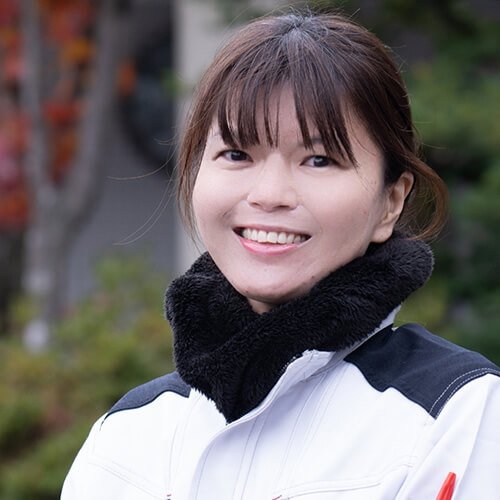
(One company) Japan Association for Construction Human Resources
Chief of Research and Development Department / Administration Department / Public Relations Department
Motoko Kano
(Kano Motoko)
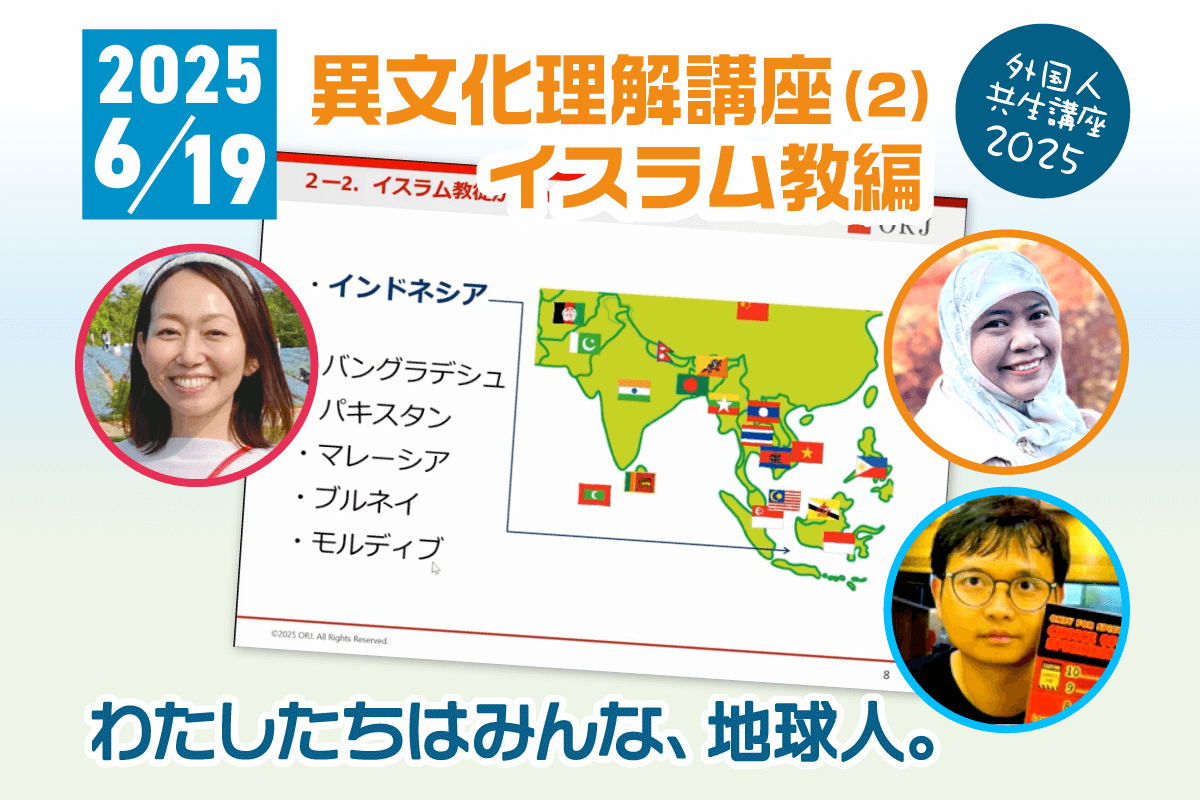
Starting in May 2025, JAC will hold a total of six courses for Japanese employees on coexistence with foreigners.
This course further brushes up on the "Plain Japanese Course," which was well received in FY2024, and is structured to reflect the voices of people close to the field.
On Thursday, June 19, 2025, we held the "Intercultural Understanding Course (2) Islam Edition," which was attended by 440 people.
The lecturer was Mr. Kawamoto from ORJ Co., Ltd., and guest staff members Marisa and Joko from Indonesia also participated. There was also a talk session where questions from the participants were answered, and the event ended on a very successful note.
Basic knowledge of Islam
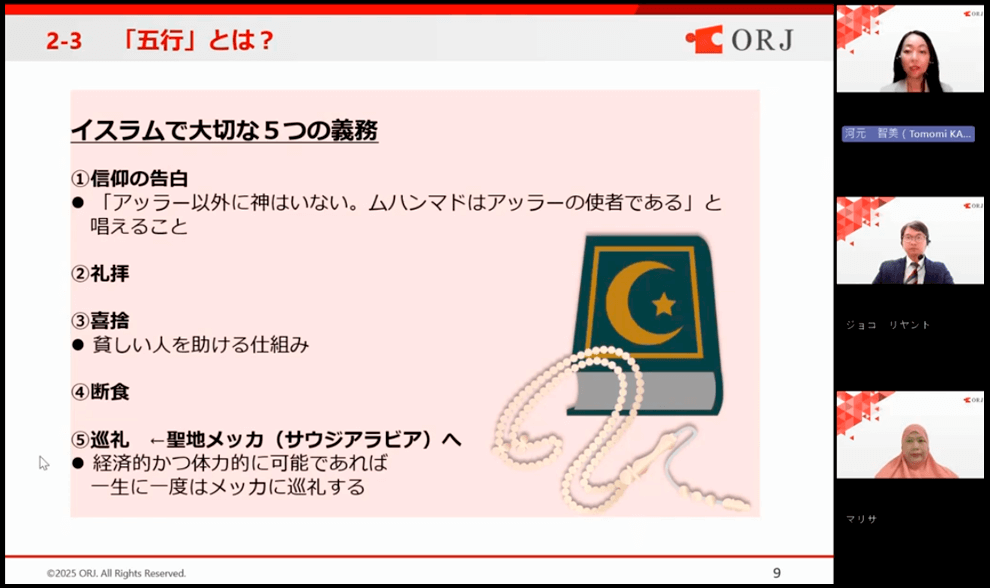
First, Marisa gave us some basic information about Indonesia.
Having a religion is considered compulsory in Indonesia, and with over 87% of the population being Muslim, it is the world's largest Islamic country.
In Islam, there are five specific actions that Muslims are obligated to follow, called the Five Principles. These are very important rules of Islam.
Jogo gave us an explanation about the five elements.
1. Confession of faith
- It is to publicly confess that there is no god but Allah and that Muhammad is His messenger.
Recite these words out loud in Arabic.
2. Worship
- It involves praying five times a day at set times (before dawn, shortly after noon, in the afternoon, after sunset and at night) facing the direction of the Kaaba (Qibla) in Mecca.
⇒It seems that midday and evening prayers can be done together, and the times can be changed at your own discretion. - Before praying, hands and feet are cleansed, preferably in a mosque (Muslim place of worship) but it can be done anywhere, with particular importance being attached to Friday prayers.
3. Giving
- It is said that during the fasting month, people donate the equivalent of 2.5 kg of rice.
4. Fasting
- During the ninth month of the Islamic calendar, Ramadan, healthy Muslims (except for those who are sick, travelers, or children) fast from sunrise to sunset.
- It is said that it cultivates patience, self-control, and empathy for the poor.
- At the end of the fast there is a big festival (Lebaran).
5. Pilgrimage
- If you are financially and physically able, make the pilgrimage to the Kaaba in Mecca, Saudi Arabia, at least once in your lifetime. The pilgrimage takes about a month.
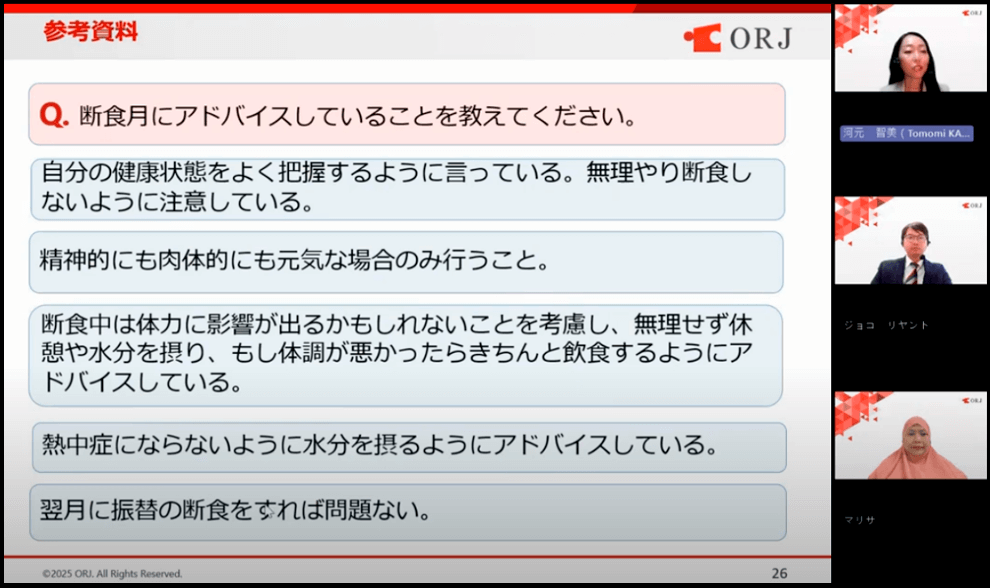
The important things are written in the Quran (the holy book of Islam).
He said that it is very important in life to follow what is written in the Quran, such as "not eating pork," "not drinking alcohol," "about personal grooming," and "not touching the opposite sex," and asked them to understand that this is very important in life.
What should I be careful about when accepting someone?
Muslims who come to Japan for work understand that there are certain restrictions on religious activities, and they practice what they can at their own discretion, so there is no need to be overly cautious.
When we think of Muslims, we tend to focus on their customs and religious rules, but there is nothing special about them. Understanding a different culture means knowing and accepting what is "normal" in that culture.
Casual comments such as "Islam is hard" or "Hijab seems hot" can hurt the other person. For Muslims, such behavior is a part of everyday life and they are not doing anything special. Marisa told us that wearing the hijab is as natural as wearing Western clothes.
In addition, there were many practical talks and realizations that changed my image of Muslims, making it a valuable opportunity to once again become aware of the gaps in my own perception.
In the participant survey, we received comments such as, "I had a preconceived notion of Islam and the lives of Muslims, but I was shocked to learn that religious activities are actually based on a flexible way of thinking."
For more details, please watch the missed broadcast.
"Lecture on Coexistence with Foreign Nationals 2025" - Missed broadcasts, materials, etc.
In FY2025, JAC will hold a total of six "Foreign Symbiosis Courses" for Japan employees.
Starting with "Cross-Cultural Understanding", the three themes of "Plain Japanese" and "Life/Transportation Guidance" will help you acquire the knowledge and responsiveness necessary to coexist with foreign human resources.
In the course, we try to communicate in both directions unique to live streaming.
There will also be a question time, so please join us!
"Foreign Coexistence Course 2025" for Japan Employees
お問合せ:(株)ORJ 担当:三浦
e-mail:
Tel:
090-3150-0562
This article is a report on the "Intercultural Understanding Course (2) Islam Edition" held on Thursday, June 19, 2025, as part of the "Foreigner Coexistence Course 2025" for Japanese employees.
Seminar Video
Seminar Materials
Seminar Materials_Intercultural Understanding Course (2) Islam 250619.pdf(1)
Q&A_Intercultural Understanding Course (2) Islam 250619.pdf
Report on the "Foreigner Coexistence Seminar" for Japanese Employees
- Report on the "Cross-Cultural Understanding Seminar (1)" for Japanese Employees [1]
- Report on the "Cross-Cultural Understanding Seminar (2) Islam" for Japanese Employees [2]
- For Japan employees [3] "Plain Japanese Course (Basics)" Report
- For Japan employees [4] "Plain Japanese Course (Application (1))" Report
- For Japan employees [5] "Plain Japanese Lecture (Application (2))" Report
- Report on the "Lifestyle/Transportation Guidance Course" for Japanese Employees (6)
The author of this article

(One company) Japan Association for Construction Human Resources
Chief of Research and Development Department / Administration Department / Public Relations Department
Motoko Kano
(Kano Motoko)
Born in Aichi Prefecture.
He is in charge of public relations, research and investigation, and is the person behind social media.
We update our social media accounts daily with the desire to make people fall in love with Japan, to spread the appeal of construction from Japan to the world, and to ensure that Japan's construction industry continues to be the industry of choice around the world.
He is also engaged in research into the feasibility of implementing skills evaluation exam in Asian countries, and is conducting interviews with local organizations in each country.
Related articles
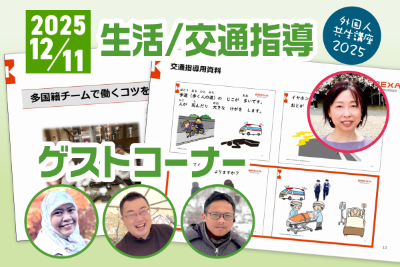
Report on the "Foreigner Coexistence Course 2025" Lifestyle/Transportation Guidance Course for Japanese Employees
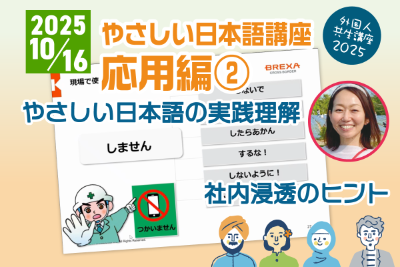
Report on the "Foreign Coexistence Course 2025" for Japan Employees Plain Japanese Lecture (Application (2))

Report on the "Foreign Coexistence Course 2025" for Japan employees Plain Japanese Lecture (Application (1))
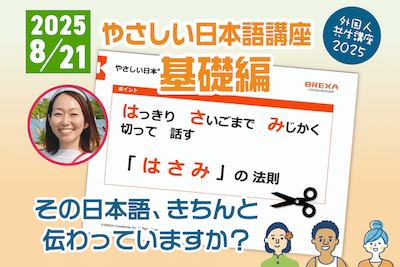
"Foreign Symbiosis Course 2025" for Japan Employees Plain Japanese Lecture (Basics) Report














